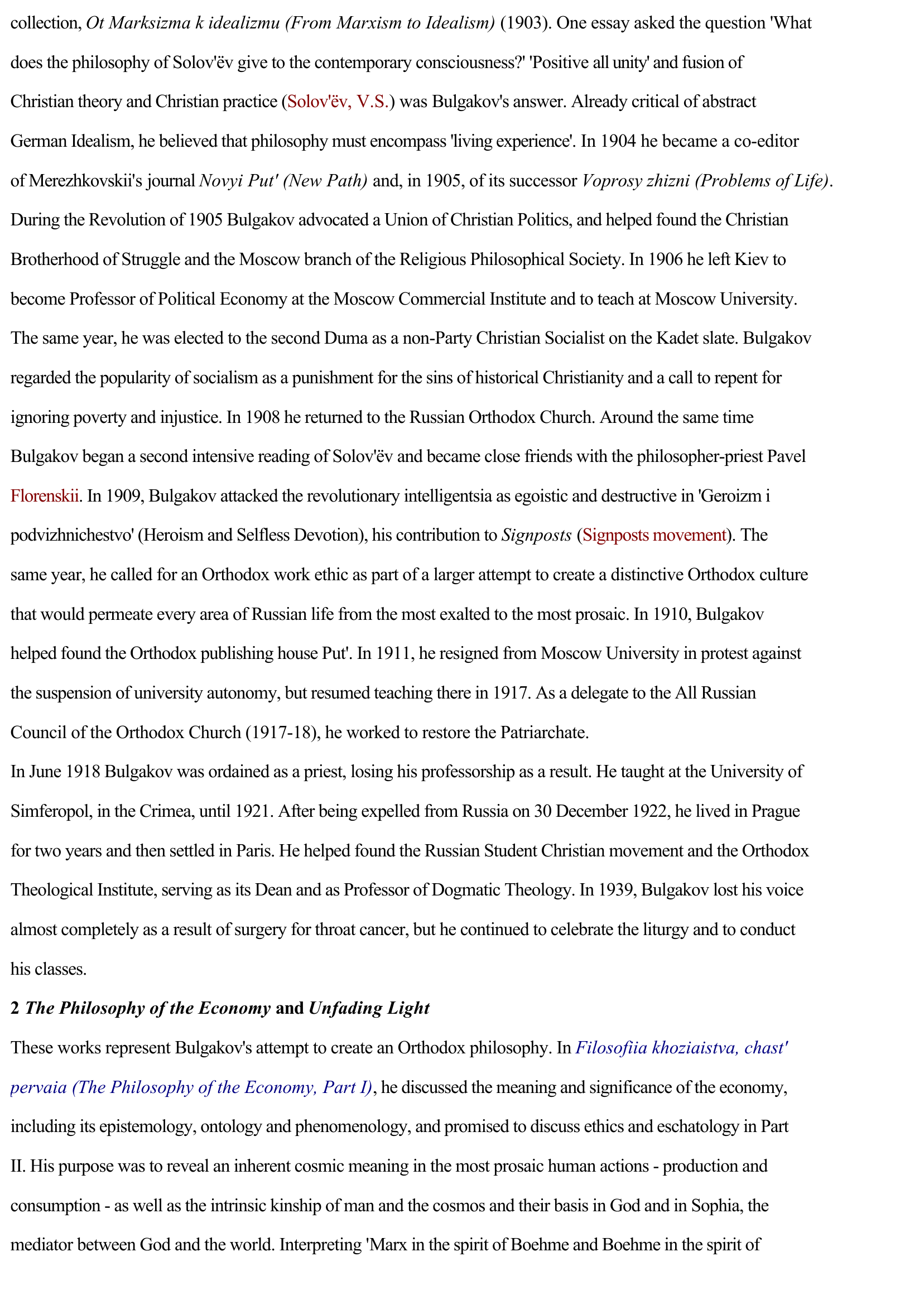Bulgakov, Sergei Nikolaevich ?
Publié le 22/02/2012

Extrait du document
«
collection, Ot Marksizma k idealizmu (From Marxism to Idealism) (1903).
One essay asked the question 'What
does the philosophy of Solov'ëv give to the contemporary consciousness? ' 'Positive all unity' and fusion of
Christian theory and Christian practice ( Solov'ëv , V.S. ) was Bulgakov's answer.
Already critical of abstract
German Idealism, he believed that philosophy must encompass 'living experience' .
In 1904 he became a co-editor
of Merezhkovskii 's journal Novyi Put' (New Path) and, in 1905, of its successor Voprosy zhizni (Problems of Life) .
During the Revolution of 1905 Bulgakov advocated a Union of Christian Politics, and helped found the Christian
Brotherhood of Struggle and the Moscow branch of the Religious Philosophical Society.
In 1906 he left Kiev to
become Professor of Political Economy at the Moscow Commercial Institute and to teach at Moscow University.
The same year, he was elected to the second Duma as a non-Party Christian Socialist on the Kadet slate.
Bulgakov
regarded the popularity of socialism as a punishment for the sins of historical Christianity and a call to repent for
ignoring poverty and injustice.
In 1908 he returned to the Russian Orthodox Church.
Around the same time
Bulgakov began a second intensive reading of Solov'ëv and became close friends with the philosopher-priest Pavel
Florenskii .
In 1909, Bulgakov attacked the revolutionary intelligentsia as egoistic and destructive in 'Geroizm i
podvizhnichestvo' (Heroism and Selfless Devotion), his contribution to Signposts (Signposts movement ).
The
same year, he called for an Orthodox work ethic as part of a larger attempt to create a distinctive Orthodox culture
that would permeate every area of Russian life from the most exalted to the most prosaic.
In 1910, Bulgakov
helped found the Orthodox publishing house Put' .
In 1911, he resigned from Moscow University in protest against
the suspension of university autonomy, but resumed teaching there in 1917.
As a delegate to the All Russian
Council of the Orthodox Church (1917-18), he worked to restore the Patriarchate.
In June 1918 Bulgakov was ordained as a priest, losing his professorship as a result.
He taught at the University of
Simferopol, in the Crimea, until 1921.
After being expelled from Russia on 30 December 1922, he lived in Prague
for two years and then settled in Paris.
He helped found the Russian Student Christian movement and the Orthodox
Theological Institute, serving as its Dean and as Professor of Dogmatic Theology.
In 1939, Bulgakov lost his voice
almost completely as a result of surgery for throat cancer, but he continued to celebrate the liturgy and to conduct
his classes.
2 The Philosophy of the Economy and Unfading Light
These works represent Bulgakov's attempt to create an Orthodox philosophy.
In Filosofiia khoziaistva, chast'
pervaia (The Philosophy of the Economy, Part I) , he discussed the meaning and significance of the economy,
including its epistemology, ontology and phenomenology, and promised to discuss ethics and eschatology in Part
II.
His purpose was to reveal an inherent cosmic meaning in the most prosaic human actions - production and
consumption - as well as the intrinsic kinship of man and the cosmos and their basis in God and in Sophia, the
mediator between God and the world.
Interpreting 'Marx in the spirit of Boehme and Boehme in the spirit of.
»
↓↓↓ APERÇU DU DOCUMENT ↓↓↓
Liens utiles
- Prokofiev Sergei Sergeïevitch
- Sergei Mikhailovich Eisenstein 1898-1948 Eisenstein est l'un de ces créatifs qui ont su concilier la recherche artistique et l'innovation esthétique avec un souffle révolutionnaire.
- Sergei Bubka.
- Sergei Mikhailovich Eisenstein
- Kapustin Sergei

































